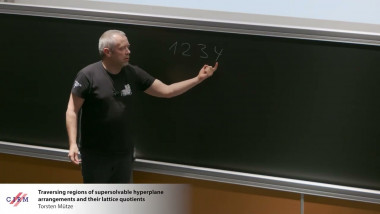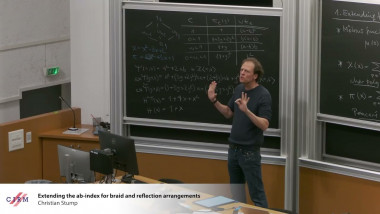
Traversing regions of supersolvable hyperplane arrangements and their lattice quotients
De Torsten Mütze

Extending the ab-index for braid and reflection arrangements
De Christian Stump
Apparaît dans la collection : Hadamard Lectures 2021 - Karim Adiprasito - Lefschetz, Hodge and combinatorics: an account of a fruitful cross-pollination
Almost 40 years ago, Stanley noticed that some of the deep theorems of algebraic geometry have powerful combinatorial applications. Among other things, he used the hard Lefschetz theorem to rederive Dynkin's theorem, and to characterize face numbers of simplicial polytopes.
Since then, several more deep combinatorial and geometric problems were discovered to be related to theorems surrounding the Lefschetz theorem. One first constructs a ring metaphorically modelling the combinatorial problem at hand, often modelled on constructions for toric varieties, and then tries to derive the combinatorial result using deep results in algebraic geometry. For instance
At this point one can then hope that indeed, algebraic geometry provides the answer, which is often only the case in very special cases, when there is a sufficiently nice variety behind the metaphor.
It is at this point that purely combinatorial techniques can be attempted to prove the desired. This is the modern approach to the problem, and I will discuss the two main approaches used in this area: Firstly, an idea of Peter McMullen, based on local modifications of the ring and control of the signature of the intersection form. Second, an approach based on a theorem of Hall, using the observation that spaces of low-rank linear maps are of special form.
